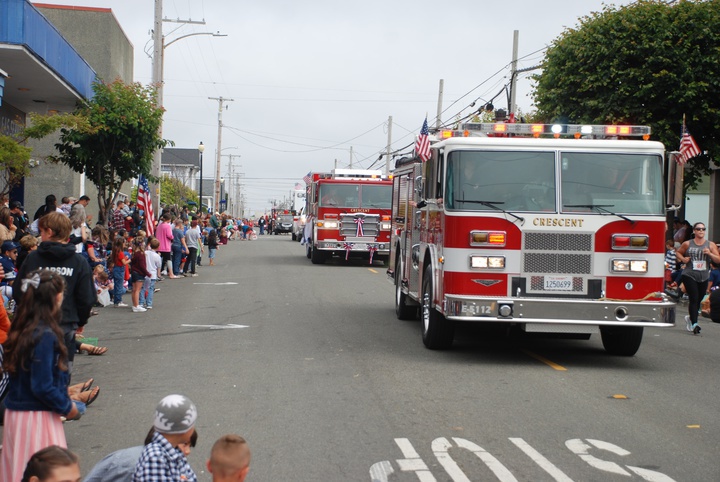Jessica Cejnar / Thursday, Dec. 10, 2020 @ 4:27 p.m. / Elections, Local Government
Crescent City Approval Of Sales Tax Measure Ordinance Prompts Discussion About The Use Of Consultants

Approved by voters last month, Measure S will help Crescent City Fire & Rescue realize a hybrid fire department plan. File photo by Jessica Cejnar
The new Crescent City Council took a final step Monday to make the voter-approved 1 percent sales tax increase for public safety official.
But its decision to approve the ordinance that places Measure S on the books, led to a discussion among its newest members over whether using a consultant to help audit city finances, review tax records and make budget projections was a wise use of taxpayer money.
“We spend a lot of money on consultant fees,” said Councilor Alex Campbell, who, along with his colleagues Beau Smith and Jason Greenough, took the oath of office as an elected official on Monday. “I think we can do a better job at figuring out for ourselves. We’re a tight community. We want to respond to each other. We want to work with each other and I think we can do a better job at limiting fees.”
Crescent City voters approved Measure S with 64.5 percent of the votes, City Attorney Martha Rice said. Though the ordinance takes effect immediately, the 1 percent sales tax won’t be collected until April 1, 2021. Crescent City will receive the first remittance from the state in June 2021, Rice said.
Though Measure S is expected to generate about $1.3 million annually for the city’s general fund, those dollars are earmarked for Crescent City Fire & Rescue’s transition to a hybrid fire department; enable the Crescent City Police Department maintain staffing levels; repair roads and potholes; and to keep the Fred Endert Municipal Pool operational.
According to Rice, about 0.57 percent of the revenue from Measure S, roughly $7,000 annually, will be retained by the California Department of Tax and Fee Administration, which collects local taxes and distributes them.
Along with approving the ordinance, the Council approved agreements with the the state Department of Tax and Fee Administration. This includes authorizing the city manager to sign an agreement with the state for preparation, administration and operation of the sales tax, Rice said.
Compensation for that work is also included, she said, though staff don’t yet know what that will be.
“In the past five years the cost has been as low as $3,900 for the City of Angel’s Camp to as high as $18,500 for the City of Sacramento,” Rice said. “There’s a range. It sounds like it depends on how many different districts have new taxes. There’s a cap of $175,000, but it doesn’t sound if it would be reasonable to get anywhere near that amount.”
The second agreement covers the 0.57 percent administration fee that will come out of the revenue from Measure S, Rice said.
The Council also authorized City Manager Eric Wier and Finance Director Linda Leaver to work with Hinderliter de Llamas and Associates to examine the city’s sales tax records.
This last authorization prompted Campbell to ask staff why using HdL is necessary.
Leaver told Campbell that the city has been working with HdL for several years. The consultant provides staff with quarterly revenue projections and economic trend forecasts for various local business sectors. The consultant also looks for errors in sales tax revenues and are able to get those revenues to the city if anything was missed, she said.
Last fiscal year, Crescent City paid $4,500 to HdL for its services, Leaver said. The consultant recovered at least $8,400 in revenue to the city, she said.
Wier also pointed out that without Measure S, sales tax revenues account for about 25 percent of the city’s total general fund. A 10 percent difference in projections could equate to a $130,000 loss for the city, he said. A 5 percent difference in projections accounts for $65,000, Wier told Campbell.
Campbell said he was concerned about the amount of money spent on consultant’s fees, saying “some things we can figure out ourselves.”
“Listening to Mrs. Leaver, it seems like we can have a discussion about where the faults are,” he said. “We don’t need to spend that money on consultant fees.”
Smith echoed Campbell’s sentiments about the city spending a lot of money on consultants.
“There’s so much money we’re supposed to get,” he said, referring to Measure S revenues.
Crescent City Mayor Blake Inscore, however, disagreed. Crescent City has limited resources and staff, he said. Having an outside party look at the city evaluate a new sales tax is a benefit, Inscore argued.
“I think it provides the community with a greater sense of security that somebody else is looking at this and evaluating this other than just our own staff,” he said.
Greenough, who would take over the role as mayor later in the meeting, said there are benefits to having a consultant look at the city’s finances.
“They’ve caught things that weren’t necessarily classified the right way, which can translate to us not getting the funds we really should be getting,” he said. “We probably would have missed those if we didn’t have consultants looking over our shoulder at our finances.”
On Tuesday, the Del Norte County Board of Supervisors unanimously approved the ordinance placing Measure R — its 1 percent sales tax increase for public safety — on the books. Measure R passed with 5,018 yes votes to 4,971 no votes.
That sales tax generates about $1.2 million for a variety of services including fixing potholes and streets, maintaining emergency dispatch services, mitigating blight and public nuisances.
Supervisors also authorized County Administrative Officer Jay Sarina to sign similar agreements with the state Department of Tax and Fee Administration to administer and distribute the tax revenue.
CLICK TO MANAGE